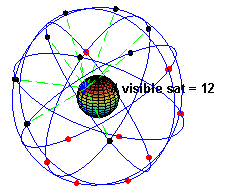
- Image via Wikipedia
How tiny waves of matter may help missiles stay on track
GPS, the Global Positioning System we rely on for guiding nuclear missiles and steering tourists to Mount Rushmore, has become a ripe target for enemy attack. In response, U.S. scientists are developing new ways to circumvent blocked GPS signals using matter waves to measure acceleration.
GPS is vulnerable because the radio signals that satellites broadcast to receivers, such as those in smart phones and in cars, are so weak that even low-power jammers can easily block them. (GPS devices use the signals from several satellites to triangulate their position.) During the past decade, China and other countries have put satellites for their own regional navigation systems into orbit that work on different frequencies, which means that on a battlefield they could block U.S. signals without disrupting their own.
To get around this potential risk, U.S. scientists are developing gadgets that can track an object’s position in the event GPS signals are cut off. These inertial measurement units, or IMUs, determine a target’s location by measuring changes in acceleration since the last GPS reading. Until now such devices, based on a variety of technologies from mechanical to laser-based, have often been bulky and prone to error after prolonged use. By taking advantage of the quantum-mechanical properties of matter, however, engineers have come up with gadgets that could prove 1,000 times more accurate.
The Latest Streaming News: global positioning system updated minute-by-minute








